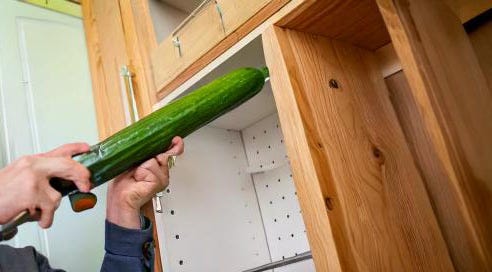Dismantling the wardrobe with a cucumber
The rise of clickbait titles in poetry; an imperative if you want to win the National Poetry Competition?
Have you noticed an increasing trend for people to title their poems - and sometimes whole collections - in such a way as to try and make them interesting, to stand out from the crowd?
‘Clickbait titles’.
Is this another inexorable trend running alongside ‘gimmickry’ and prose masquerading as poetry?
For example, you might have written a perfectly competent poem about the collapse of a marriage using the break-up of the home as the central image or metaphor. It would be perfectly reasonable to call the poem “Divorce” or something similar - but then you hit on the idea of calling it “Dismantling the wardrobe with a cucumber” because a) there are probably thousands of poems titled “Divorce”, so b) who’s going to be drawn into reading yours if it has such a bland title, and c) “Dismantling the wardrobe with a cucumber” will surely pique interest - after all, who else is going to call their poem that?!
Oh, and d) competition judges are likely to be drawn to it too…
Come to think of it, if you make it prosy and gimmicky too, how can you possibly fail?
But what are the origins of all these clickbait titles?
Culture
It’s a banal statement for sure, but Social Media has changed our culture forever. Twitter’s 140 character limit was the first big driver. If you wanted to say something you needed it to be punchy to stand-out. Such interactions ceased to be about communication and became focused on soundbites. And we started to see them everywhere - especially, one might argue, in politics.
The important thing became to be seen to offer a contribution of some kind - and it didn’t have to be true or meaningful.
Subsequent social media platforms have doubled-down on the soundbite. Posts on Instagram, TikTok and Twitter/X rarely ‘say’ anything meaningful, and these days the worshipped god is one which feasts on likes and shares and follows. Under such circumstances, how best do you satisfy that god..?
Perhaps it is inevitable that the trend towards the brief, the off-the-wall, and the wacky has inevitably spread to poetry too. How could it not?
I fear this quote from Charles Bukowski is not longer generally true:
“To expect power out of garbage is to expect too much.”
Reality tv anyone?
Competition
The second driver - and entirely related to cultural trends - is the ferocity of competition that writers face.
A few decades ago there may have been as many people writing as there are today, but a far smaller proportion could expect their work to be read. Perhaps in those days readers were more likely to be drawn to a ‘known name’ - i.e. ‘the published’ - than seek out someone new to read.
But given the democratising nature of the internet - and the vast communication platforms it now supports - the game has changed. Where you might once have written just for yourself or a few friends, now you can share your work - potentially with billions of people - at the click of a mouse.
Which, arguably, is great. But how do you get people who don’t know you to take an interest in your work, especially when they’re inundated with thousands of other writers also clamouring for their attention? Well, clickbait titles are certainly one way.
For an upcoming issue of a long-established literary magazine, the editors have had over 1,000 poems and over 100 short stories submitted. Choosing ‘the best’ from those must have been a daunting task. Surely it would be no more than an understandable instinct to perhaps assume a poem titled “Dismantling the wardrobe with a cucumber” is likely to be more interesting than one simply called “Divorce”…
And what about the National Poetry Competition, where the judges have the unenviable task of sifting through over 17,000 entries?
Here are the titles of five of the last six winners of the NPC:
"The posh mums are boxing in the square"
"Reading the Safeguarding and Child Protection Policy"
"The Fruit of the Spirit Is Love (Galatians 5:22)"
"My Dead Father's General Store in the Middle of a Desert"
"The Time I Was Mugged in New York City"
They may well have been the best poems, I can’t possibly know - but in terms of clickbait titles, I rest my case.
So what does all this mean?
Something and nothing?
Well, as ever, it depends. It depends on what you write - in terms of subject - and how you write - in terms of form and tone etc. But most of all it depends on why you write, that fundamental question we all too rarely ask ourselves.
If you want to be read by lots of people, do well in competitions, get ‘a name’, then perhaps you need to think about adopting clickbait titles.
So I’ve decided I’m going to experiment a little, not just with clickbait titles but gimmickry too. I’m going to put my ropey little theory to the test and attempt to answer the question “am I more successful with submissions and competitions if I write gimmicky ‘poems’ and/or use clickbait titles?”
I’ve already written and submitted my first truly gimmicky non-poem to a prestigious competition. I’ll let you know how I get on…
Are you a poet? Do you use clickbait titles? Do you agree with my fag-packet analysis? Please leave a comment - oh, and try to play nice..!
“when you see anything of mine that you don’t like remember that I’m sincere in doing it and that I’m working toward something.” - Ernest Hemingway







I love this on the titles of poems and the in and out 'fashions' you feel you have to abide by in order to try and be heard as a poet. You're not alone Ian.
Love to see that poem Ian !